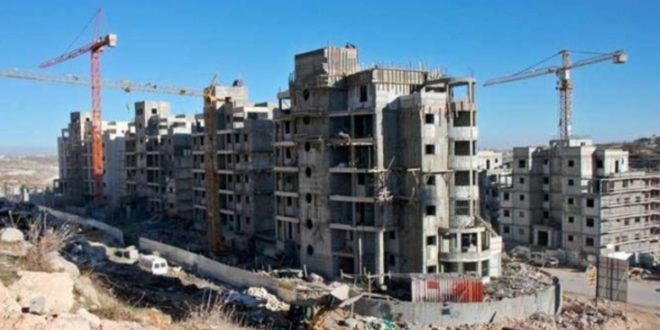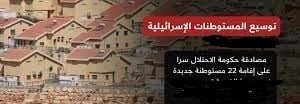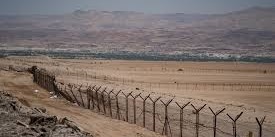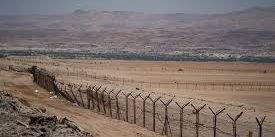By: Madeeha A’raj
The National Bureau for defending land and resisting settlements ( nbprs ) stated in its latest weekly report , that Naftali Bennett’s government is very interested in translating the racist nation-state law on the ground, which was approved by the Knesset in 2018 that limits the right to self-determination between the sea and the river in Palestine merely to the Jews. It widely exploits the US administration’s preoccupation with files other than the the political settlement of the Palestinian-Israeli conflict, in order to move forward with the implementation of settlement plans that exceed the agenda of the previous government.
It also exploits the US Administration’s weak policy that prefers keeping the existing government coalition in Israel rather than clashing with it in a matter that may lead to its collapse, and pave the way for Netanyahu’s return to office. Hence, settlement in Naftali Bennett’s government takes on new dimensions that will place heavy restrictions for any chance of the so-called two-state solution, and the establishment of a Palestinian state next to the Israeli on. Building settlement was approved by the previous government of Benjamin Netanyahu and left the task of implementing it to any alternative Israeli government, such as bypass roads, transportation stations, electrical connection projects, and others.
Knowing that since President Joe Biden assumed the presidency in the United States, the occupation authorities approved the construction of thousands of settlement units in a number of settlements and outposts in the West Bank, and the so-called “Higher Planning Council” at the “Israeli Civil Administration” announced that it will approve, next week the construction of 3100 new housing units, which will be distributed among 30 settlements and outposts, the largest of which is in the settlements of “Ravafa” 399, “Kedumim” 380, “Kfar Etzion” 292 and “Har Bracha” 286.
On a different level, head of the settlements council in the northern West Bank, Yossi Dagan, revealed the construction of a huge transport station near the settlement of “Rahelim”, south of the city of Nablus. The project is located near the Za’tara checkpoint on the lands of Sakaka and Yasouf in the Salfit and Nablus Governorates, at a cost of NIS 40 million that contains 300 bus stops, an operational area, a fuel station, a laundry, in addition to office buildings.”
These buses will transport settlers between the northern West Bank, the Jordan Valley, southern Palestine and the Tel Aviv areas. It will be completed in 6 months. This station will change the map of services for settlers in the settlements of “Rahalim”, “Nevi Nehemiah”, “Kfar Tabuh”, “Migdalim” and “Shilo”. Dagan believes that this project constitutes a “transport revolution” taking place in parallel with the revolutions. Others include high-speed internet, education, sports facilities, water infrastructure, as well as the general electricity scheme that is under preparation in the northern West Bank.
As for Ayelet Shaked, Minister of the Interior intends to link settlements in the West Bank to the Israeli electricity network. Also, the former Israeli Minister of Energy, Yuval Steinitz, had instructed the development of a plan to develop the activity and the Israeli electricity network in the occupied Palestinian territories, to supply the settlements with electricity, claiming to rationalize energy services and electricity, and improving it for settlers and Palestinians alike, which practically conceals intentions to strike the “Al-Quds” Electricity Company – the largest energy provider in the Palestinian territories – and to install infrastructure services for Israeli settlements as part of the actual annexation of Israeli settlements.
In a move that would turn the settlement councils into a policeman who monitors the Palestinian construction movement in the C areas, the occupation government approved the transfer of NIS 20 million to 14 “settlement councils” in the West Bank, in favor of implementing the plan to form tams for monitoring Palestinian construction, which is described as illegal”. Knowing that, the plan was prepared during the era of the previous government.
According to the plan, each settlement council will receive a budget of NIS 4 million, provided that budgets are allocated to form crews, teams and field patrols equipped with photographic equipment such as small helicopters and others. Note that the task of the councils will be monitoring, control and documentation in the field, and they will not have any powers to issue demolition notices, but rather to inform the occupation authorities of all the construction works they have documented for the Palestinians.
List of Israeli Assaults over the Last Week Documented by the National Bureau:
Jerusalem:
- Forcing Jerusalemites to demolish residential rooms in the Wadi Al-Joz neighborhood and pay NS 100,000 since 2005 as violations for building an additional room in the house,
- Notifying was given to demolish a house and a caravan, a “baraks” in Silwan town on the pretext of not having a permit, and others in the villages of Beit Surik for a women’s center.
- Demolishing the foundations of a retaining wall and a car wash in the Silwan town.
- Restoring of the “Pride of Israel synagogue,” that was destroyed in the aftermath of the battles with the Zionist “Haganah” gangs in 1948. It is 100m away from the “Al-Khrab synagogue” located within the walls of the old city. According to leaked data, the new construction will exceed the height of the old city wall, and will obscure. Many Arab and Islamic landmarks.
Hebron:
- Attacking citizens in the Al-Atara area, east of Yatta, south of Hebron, while settlers installed water tanks to irrigate the trees they planted in the area adjacent to the settlements of “Avigal”, “Susya” and “Mitzpe Yair”
- Demolishing a house in the “Farsh al-Hawa” area, west of Hebron, in addition to a water well, and the walls surrounding the house. And demolishing another under construction in the village of Sikka, southwest of Hebron, owned by Ahmed Issa Jawadah.
Bethlehlem:
- Bulldozing 10 dunams in the Khallet al-Nahla area near Wadi Rahal village, south of Bethlehem, planted with olive saplings, owned by Ibrahim Obayat.
- Notifying to demolish 3 houses under construction in the village of Al-Minya, southeast of Bethlehem.
- Notification to stop work in 4 agricultural rooms in the village of Artas, south of Bethlehem, in the “Bako” area, south of the village. under the pretext of not having a license.
- Attacking citizen Ayed Abdel Aziz and his family while they were picking olives on their land in the Banyas area, west of the town of Nahalin.
Ramallah:
- Uprooting and cutting down more than 300 olive trees from the lands of the town of Al Mazra’h Al-Gharbia, north of Ramallah in order to prevent citizens from entering that area, especially after closing the agricultural road leading to it by an Iron Gate and concrete blocks.
Qalqilya:
- Preventing farmers of the villages of Ezbet Salman, Ezbet Al-Ashqar, Azzun Atmeh, Beit Amin, and Senaria from entering their lands to harvest olives, despite obtaining the necessary permits south of Qalqilya. It is noteworthy that the area planted with trees, but isolated behind the apartheid wall.
Jenin:
- Storming the Yabad town, destructing and bulldozing the new paved road that connects the town and the Mreaha Neighborhood, amid large military reinforcements, after handing over a notification to the municipality, knowing that the municipality of Ya’bad flattened and paved the 1 kilometer long street about 2 months ago at a cost of US $ 100,000 . It is a vital road to the area as it facilitates the passage of school and university students, and farmers to their lands, especially during the olive season.
- Moreover, carrying out military training in the outskirts of the town of Ya’bad and the village of Kafert, west of the city of Jenin, where the military vehicles entered the orchards, agricultural lands and vineyards and caused the destruction of crops.
Jordan valley:
- Demolishing parts of a paved road northeast of Tayasir, with a length of 1600 m. The occupation usually targets roads linking Palestinian communities by destroying them in whole or in part.
- Seizing land for citizens west of Jericho. Knowing that the area witnesses repeated attacks by settlers and occupation soldiers against the citizens and their lands.
 المكتب الوطني للدفاع عن الارض ومقاومة الاستيطان منظمة التحرير الفلسطينية
المكتب الوطني للدفاع عن الارض ومقاومة الاستيطان منظمة التحرير الفلسطينية




